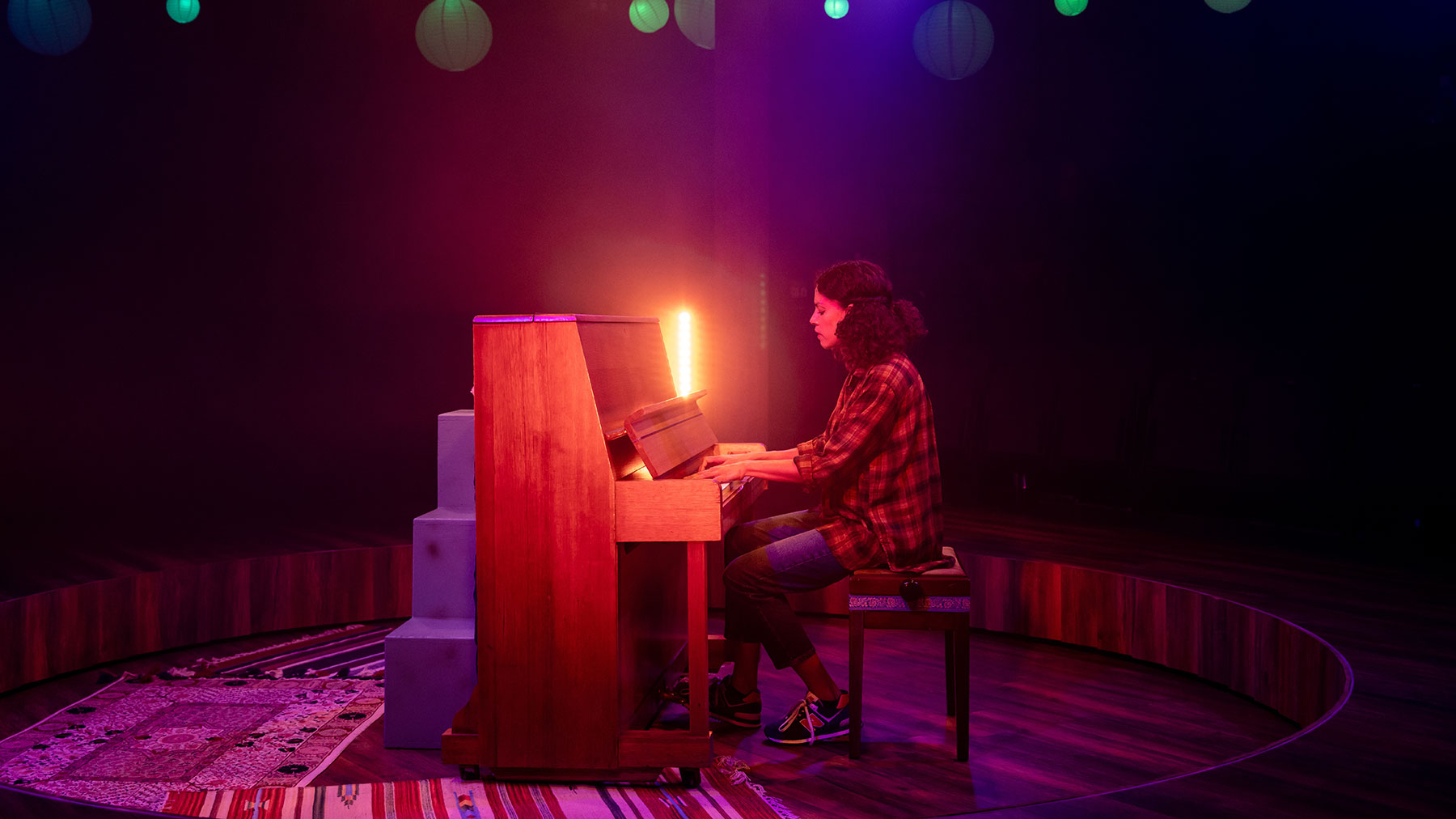
Writer and performer Anoushka Lucas delivers an authentic and charming performance in her debut play, Elephant. Packed with personal stories and enhanced by live singing, this intimate blend of new writing and music cleverly takes us on a journey to contemplate mixed-race identity juxtaposed with the legacies of the British Empire.
Elephant is a slow creeper of a show which takes you by surprise. The plot is non-linear, and we ebb and flow between protagonist Lylah’s adolescent years and young adulthood.
Lylah, who grew up in a council property in London (she’s careful to inform her audience that it is not on a typical rough estate) is of Cameroonian, Indian and English descent. Both parents were always busy but Lylah knew she had to ‘be wise’ to retain her scholarship at a prestigious French-speaking school which also specialises in music. She was the only pupil with dark tones attending the school and all the teachers liked her.
One day her parents surprised her with her own grand piano made out of mahogany. Now a young adult, Lylah is making progress in her music career and settling into a new relationship with Leo, a fellow musician. Despite the pair getting on really well and being compatible in many aspects of their lives, something still doesn’t feel right.
There are no obvious dramatic tensions – the pace of the performance may have felt tamed but its content packs a punch. By the end of the performance, you realise that you’ve been hit quite a few times and you’re wondering how on earth it happened. Well, Lylah’s endearing stories come with a swirl of microaggressions that people of colour are accustomed to. It’s the norm and we simply roll our eyes now when we exchange our expectations with one another.
“An authentic and charming performance”.
The racist remarks Lylah gets are wrapped up in niceties or disguised as part of playground games that get laughed off. And it’s not just from white people she receives such comments; the black side of her family has chimed in that she speaks weirdly, while music producers want her to tone down her posh accent and push her towards making ‘black’ music with Stormzy and becoming the British version of Alicia Keys.
The writing and delivery have many textures; it translates as a Ted talk, comedy, autobiography and gig on stage. The variety of styles in the show is applaudable and each section is well crafted. Honestly, they blend so well and there wasn’t a moment of “Where has that come from?” In the show. The topics explored are easily ‘rantable’ but the artist has steered clear of that path.
I think this is important as many shows that explore race tend to be filled with anger and inevitably cause the audience to shut down. However, I did want her to play the piano angrily towards the end when she ‘went off’ on her boyfriend’s family. We hear fascinating facts about the mahogany tree, elephants’ tusks and the gruesome connection to slavery and colonialism. By the end it dawns on you how deadly the British Empire is and its role in climate change: “When they cut down all the mahogany trees they made plantations, so this piano in Europe left a hole on Caribbean soil that was covered up by the African hands”.
The elephant in the room is the piano taking centre stage and it is used as a metaphor. In a search for answers Lylah asks her piano to tell her stories of everywhere it’s been; “Where did you come from? Why are you here? How did you get here?” The piano’s journey is as complex as her own identity. Its journey began in Africa and has travelled to the Caribbean before landing through the window of her living room. Many of us are aware that the keys are fashioned from the tusks of an elephant. Admittedly I’ve never given any thought about the wood used to adorn it.
We’re also educated on the origins of words like ‘behave’ and ‘blue’ and how their meanings change in other languages. Fellow lovers of language would find this delightful! This was one of my favourite parts of the show.
Lucas’s lyrics are meditative and thought-provoking. The warmth in her voice, when she sings, offers respite and draws the audience closer before leaving us on a haunting note.



























